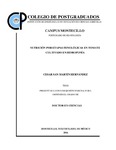Nutrición por etapas fenológicas en tomate cultivado en hidroponía.
Abstract
Durante el ciclo biológico, las plantas demandan diferentes nutrimentos que afectan su fisiología, rendimiento y calidad de cosechas. De ahí que sea necesario investigar la nutrición por etapas fenológicas y evaluar su impacto en el crecimiento, rendimiento y calidad del fruto. Los objetivos de esta investigación fueron: a) evaluar el efecto concentraciones crecientes en la solución nutritiva de N a 10, 12, 14 y 16 molc m-3 aplicado en etapa vegetativa y K con 5, 7, 9, 11 y 13 molc m-3 suministrado en etapa reproductiva, sobre la producción de biomasa, el crecimiento, el rendimiento y la calidad del fruto; b) identificar las dosis de N y K óptimas según el rendimiento y calidad del fruto de tomate hidropónico. Los resultados mostraron que en etapa vegetativa, al suministrar N de 10 a 16 molc m-3, se incrementaron el área foliar (AF), biomasa seca vegetativa (BSV), índice de área foliar (IAF), duración de área foliar (DAF) y el porcentaje de N de hojas y tallos; el crecimiento se ajustó a un modelo cuadrático que varió por el N. En la etapa reproductiva, conforme aumentó el K en la solución nutritiva de 5 a 13 molc m-3, se incrementaron AF, BSV, IAF y DAF; el crecimiento del cultivo se ajustó a un modelo lineal negativo y cuadrático con efectos del K; la concentración de N y K en hojas, tallos y frutos, creció según el nivel de N y K suministrado; también, la aplicación de N de 10 a 16 molc m-3, aumentaron los azúcares reductores y totales, vitamina C, luminosidad, porcentajes de jugo (% jugo) y acidez del fruto, pero disminuyeron los sólidos solubles totales (SST), Hue, licopeno y β-caroteno; y al elevar el K de 5 a 13 molc m-3, los azúcares reductores, SST, licopeno, luminosidad, % jugo, la acidez del fruto y el rendimiento aumentaron, pero el valor de Hue se redujo. Las dosis más recomendables para lograr la mejor calidad y rendimiento se encontraron con el suministro de N de 12 a 16 molc m-3 y K con 9 a 13 molc m-3. El incremento del suministro de N y K por etapas fenológicas mejora el crecimiento, rendimiento y la calidad del fruto de tomate hidropónico. _______________ NUTRITION BY PHENOLOGICAL STAGES IN TOMATO CULTIVATED IN HYDROPONICS. ABSTRACT: During their life cycle, plants require different nutrients that affect physiology, yield and crop quality. Therefore, there is a dire need to investigate nutrition requirements per growth stages and assess its impact on growth, yield and fruit quality. The objectives of this research were: a) to evaluate the effect of increasing N concentrations in the nutrient solution at 10, 12, 14 and 16 molc m-3 applied in vegetative stage, and K concentration at 5, 7, 9, 11 and 13 molc m-3 supplied during the reproductive stage on biomass production, growth, yield and fruit quality; b) to identify the optimal dose of N and K on yield and fruit quality of hydroponic tomatoes. The results showed that in vegetative stage, the supply of 10-16 N molc m-3 increased leaf area (LA), vegetative dry biomass (VDB), leaf area index (LAI), leaf area duration (LAD) and the percentage of N of leaves and stems; growth was adjusted to a quadratic model that varied according to N concentrations supplied. In the reproductive stage, as K in the nutrient solution increased from 5-13 molc m-3, the LA, VDB, LAI and LAD also increased; crop growth was adjusted to a negative linear and quadratic model with effects of K; N and K concentration in leaves, stems and fruits, rose according to the levels of N and K supplied; also, the application of N 10-16 molc m-3, increased the reducing and total sugars, vitamin C, luminosity, percentages of juice (% juice) and fruit acidity, but decreased the total soluble solids (TSS), Hue, lycopene and β-carotene; while when increasing the K concentration from 5-13 molc m-3, the reducing sugars, TSS, lycopene, brightness, % juice, fruit acidity and yield increased, but decreased Hue values. The most recommended dose to ensure the best quality and yield are with N of 12-16 molc m-3 and K of 9-13 molc m-3. The increased supply of N and K by phenological stages improves growth, yield and fruit quality of hydroponic tomato.
Collections
- Tesis MC, MT, MP y DC [349]


